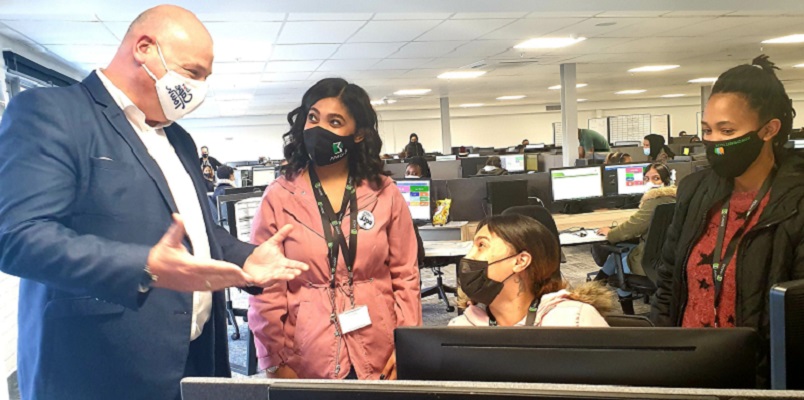Have you ever wondered how much easier travel has become, thanks to the digital innovations shaping our world? Exploring new destinations used to mean…
Behind the numbers – meet the people who need our job creation efforts [Opinion]

This week the country marked Youth Day. We must continue to bear in mind the work that needs to be done to restore dignity to young South Africans today. I say this in light of the figures in Statistics SA’s Quarterly Labour Force Survey for the first quarter of 2021, which showed that 32,4% of people aged 15 to 24 years were not in employment, nor education or training. One in three young South Africans has completely given up on even the prospect of finding a job one day.
During my tenure as the City of Cape Town’s Mayoral Member for Economic Opportunities and Asset Management, I’ve seen just what economic opportunity – and a lack thereof – means for people.
One in three young South Africans has completely given up on even the prospect of finding a job
There is no one-size-fits-all magical solution that works for all countries or even cities as each environment comes with its unique challenges. Here in SA, a myriad of issues – from load-shedding to unreliable public transport to unaffordable data costs – affects everyone from the business owner, to the intern, to the disaffected 20-something.
Affecting real change
This is why our economic recovery efforts take into account the global village in which Cape Town exists and the City’s unique social landscape. What my team and I have begun to witness is that by working on the ground in specific sectors, we can effect real change.
Over the past five years, the City, via the Department of Enterprise and Investment, has put more than R233 million towards training and job placements in key sectors.
The result is 27 137 jobs have been created, a further 11 025 persons trained in work readiness, and R22,68- billion reaped in the form of commercial investments, which in itself, has created countless more employment opportunities.
Our approach is to work closely with Strategic Business Partners (SBPs) in what we identified as high growth sectors. These SBPs are at the coalface in communities, recruiting people for jobs and training. For the sake of brevity, I’m going to focus on just four sectors: clothing and textile, call centres (also known as Business Process Outsourcing), technology, and renewable energy production.
The clothing and textile industry had previously been decimated by the influx of cheap imports. But with programmes such as the SME Business Accelerator Project, which connects small enterprise manufacturers with large retailers, much industry knowledge has been brought back into the market, while a new generation of artisans is being trained in new trends and technologies.
As a result, we are globally competitive, with exports to Africa, the United States and elsewhere flourishing.
To meet this growing demand, we have rolled out the Cape Skills and Employment Accelerator Project, which focuses specifically on creating employment opportunities for marginalised youth and women. Under the initiative, the City is contributing R55-million over three years towards training and work placement in companies in the clothing and textile and call centre sectors.
Cape Town’s call centres are another example of enabling industry to effect stellar growth, even amid the pandemic.
Between July 2018 and March 2021, the City allocated R28,5-million towards skills development and training via its SBP, CapeBPO.
Now, the sector employs more than 60 000 people in Cape Town across the domestic and foreign market. The City accounts for more than half of the international operations in SA.
A pivotal factor in these programmes is reaching people where they are so that we foster new economic hubs across the city. This helps to grow community economies and simultaneously eases the burden for residents in spending time and money on transport to faraway jobs.
The Cape Innovation and Technology Initiative
For instance, our tech SBP, the Cape Innovation and Technology Initiative (CiTi) set up SA’s only township-based tech hub, Bandwidth Barn in Khayelitsha. Community members have access to meeting spaces and WiFi as well as business development workshops. Through these initiatives, CiTi has supported more than 3000 entrepreneurs.
So great is the growth of Cape Town’s tech and call centre sectors, that the city has become a major drawcard for business giants such as Amazon, which will be setting up its new headquarters here.
And equally, our investment efforts into frontier markets, such as green technology production, are paying off. With the local industry set to be worth approximately R110.5-billion by 2035, Cape Town has already begun capitalising on this growth through the Atlantis Special Economic Zone.
And it is locals from the area who stand to benefit the most with training – from welders, boilermakers to manufacturing wind, solar, waste, and water-energy technologies. These are wide-ranging skills that set them up for highly sought-after work in an industry that will surely dominate the energy production landscape in just a few short years.
Returning to Labour Force Survey Q1 2021, we glean that the vast majority of the tens of thousands of people who are becoming employed, are between the ages of 18-35 and are from historically low-income communities. About 60% of them are women.
While we can take some comfort from these facts, we have much work ahead in creating further access to opportunities for those who fall into Cape Town’s unemployed bracket. This is the basis for our recently–launched programme, JobsConnect, which has two distinct purposes: to link businesses, particularly SMMEs (who absorb up to 80% of the country’s workforce) and Corporates to the appropriate talent, and to provide knowledge, training and employment opportunities to job seekers.
I’ve found in my interactions with businesses that one of their biggest struggles is sourcing the talent and skills that they need to maintain and grow their operations. At the same time, there are thousands of people who are eager to work, but who haven’t received enough training or guidance in how to make themselves job-ready and available to companies, or quite simply, don’t know that these opportunities exist.
These are just a few of our programmes, focussing on job readiness, talent matchmaking and staying current with what businesses need. We know that each year more job seekers enter the market, and our competitive edge is to be flexible and relevant so that as work skills evolve, we must be ready for change.
Because behind all the statistics are the people for whom jobs not only help to put food on the table but bring a vital sense of dignity. This is why we must work harder than ever to help the people of Cape Town and SA to be ready for the opportunities that lie ahead.
This article was written by Alderman James Vos, Mayoral Committee Member for Economic Opportunities and Asset Management for the City of Cape Town.
Read more: Cape Skills Accelerator creates employment opportunities for young Africans
Featured image: Alderman James Vos, Mayoral Committee Member for Economic Opportunities and Asset Management (Supplied)

